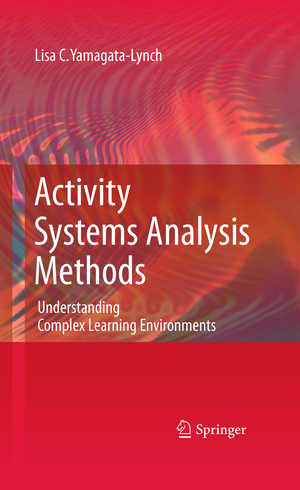Activity Systems Analysis Methods: Understanding Complex Learning Environments
Autor Lisa C. Yamagata-Lynchen Limba Engleză Hardback – 28 iul 2010
| Toate formatele și edițiile | Preț | Express |
|---|---|---|
| Paperback (1) | 634.00 lei 6-8 săpt. | |
| Springer Us – 17 oct 2014 | 634.00 lei 6-8 săpt. | |
| Hardback (1) | 640.24 lei 6-8 săpt. | |
| Springer Us – 28 iul 2010 | 640.24 lei 6-8 săpt. |
Preț: 640.24 lei
Preț vechi: 753.22 lei
-15% Nou
Puncte Express: 960
Preț estimativ în valută:
122.51€ • 128.25$ • 101.37£
122.51€ • 128.25$ • 101.37£
Carte tipărită la comandă
Livrare economică 05-19 aprilie
Preluare comenzi: 021 569.72.76
Specificații
ISBN-13: 9781441963208
ISBN-10: 1441963200
Pagini: 166
Ilustrații: XVI, 148 p.
Dimensiuni: 155 x 235 x 19 mm
Greutate: 0.41 kg
Ediția:2010
Editura: Springer Us
Colecția Springer
Locul publicării:New York, NY, United States
ISBN-10: 1441963200
Pagini: 166
Ilustrații: XVI, 148 p.
Dimensiuni: 155 x 235 x 19 mm
Greutate: 0.41 kg
Ediția:2010
Editura: Springer Us
Colecția Springer
Locul publicării:New York, NY, United States
Public țintă
ResearchCuprins
Activity Systems Analysis and Its Value.- Understanding Cultural Historical Activity Theory.- Activity Systems Analysis Critics.- Examples of Activity Systems Analysis Used in Research for Various Purposes.- Qualitative Research in Activity Systems Analysis.- In-Depth Examples of Activity Systems Analysis Research.- Concluding Remarks.
Textul de pe ultima copertă
Cultural Historical Activity Theory (CHAT) has its origins in Lev Vygotsky’s pioneering work in the 1920s. More recently, education scholars have used CHAT to study learning behavior through the creation of activity systems analysis. Activity Systems Analysis Methods brings the CHAT framework into clear practical focus to offer a non-dualistic perspective on contemporary learning process in context. By focusing especially on methodologies, and including numerous real-life examples, the book moves beyond the theoretical realm to provide readers with expert guidance in mapping and evaluating complex learning interactions in natural environments. This first-of-its kind volume: • Summarizes the theoretical development of CHAT and activity systems analysis.• Explains how researchers perform activity systems analysis, and ways it benefits educational research and practice.• Addresses challenges to the validity of activity systems analysis.• Provides detailed examples of activity systems analysis used toward various research goals.• Identifies methodological issues salient to designing and conducting CHAT-related studies in qualitative research.• Refers readers to additional resources on activity systems analysis theory, methods, and issues.Education researchers, particularly in instructional technology and design, learning sciences, and educational psychology, will find Activity Systems Analysis Methods an exciting resource for adding new relevance and value to their work.
Caracteristici
Discusses the values of activity systems analysis for graduate students and researchers interested in studying complex learning environments Provides guidance for graduate students and researchers designing a study using activity systems analysis Provides methodological guidance and in-depth examples Includes supplementary material: sn.pub/extras

